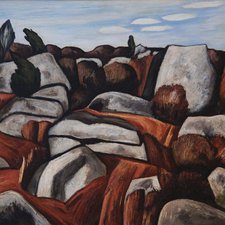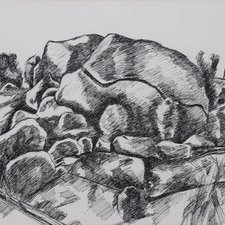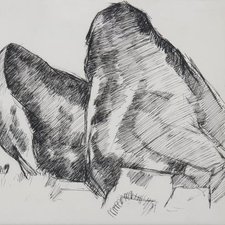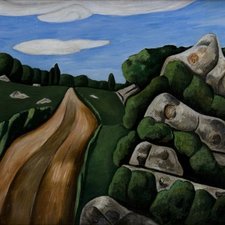Marsden Hartley
1877 - 1943
Marsden Hartley visited Cape Ann on four occasions in the years 1920, 1931 and 1934. Restless by nature, he shied away from the busy waterfront area favored by other artists and gravitated instead towards the long abandoned Colonial-era settlement in the center of Cape Ann known as Dogtown.
The Influence and Inspiration of Dogtown
For Hartley, treks into Dogtown offered the chance for renewal through contact with the land. "I go alone," he wrote, "empty handed & sit in Dogtown Common—a weird stretch of land ... all boulders and scrub." To Hartley, the place looked "like a cross between Easter Island and Stonehenge—essentially druidic in its appearance." The paintings he created during these sojourns were colorful, flat, angular compositions. On the back of some of them, Hartley wrote poetry, also inspired by the lay of the land.
Dogtown was the site of one of the earliest settlements on Cape Ann. It is estimated that between 60 and 100 families lived in the area during the late 1600s. During the early decades of the 18th century as the community evolved from an agrarian based economy to a maritime one, residents left Dogtown for the harborfront area. By the 1930s, when Marsden Hartley discovered Dogtown, it was a rock-strewn wilderness, "full of magnificent boulders driven & left by the glacial pressures years ago."
Today, Dogtown remains a largely unspoiled open space. In the early 1980s, in a an effort to prevent future development, Robert L. French headed up a group of concerned citizens who successfully raised funds on behalf of the City of Gloucester to purchase several tracts of land in Dogtown which remained in private ownership.



